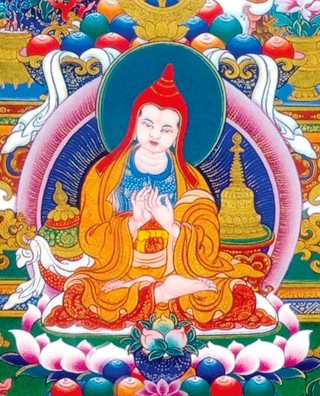Lojong: Difference between revisions
mNo edit summary |
mNo edit summary |
||
| (16 intermediate revisions by 5 users not shown) | |||
| Line 1: | Line 1: | ||
[[image:Atisha.JPG|frame|Jowo Jé Glorious [[Atisha]]]] | [[image:Atisha.JPG|frame|Jowo Jé Glorious [[Atisha]]]] | ||
'''Lojong''' ([[Wyl.]] ''blo sbyong'') — literally ‘training the mind’, or ‘transforming the mind’. These teachings, which emphasize the practice of [[bodhichitta]] and especially [[relative bodhichitta]] and the 'exchanging oneself for others', were introduced to Tibet by Lord [[Atisha]] in the eleventh century. Unlike the [[lamrim]] teachings, which were also introduced by Atisha at the same time, and which can be practised by anyone, the lojong teachings are intended primarily for disciples of the highest capacity and were not taught widely until the time of [[Geshe Chekawa]]. | '''Lojong''' (Tib. [[བློ་སྦྱོང་]], [[Wyl.]] ''blo sbyong'') — literally ‘training the mind’, or ‘transforming the mind’. These teachings, which emphasize the practice of [[bodhichitta]] and especially [[relative bodhichitta]] and the 'exchanging oneself for others', were introduced to Tibet by Lord [[Atisha]] in the eleventh century. Unlike the [[lamrim]] teachings, which were also introduced by Atisha at the same time, and which can be practised by anyone, the lojong teachings are intended primarily for disciples of the highest capacity and were not taught widely until the time of [[Geshe Chekawa]]. | ||
==Literal meaning== | |||
The word ''lo'' means mind, but specifically the untamed thinking mind. ''Jong'' can mean to learn, exercise, train, purify or refine. [[Alak Zenkar Rinpoche|Zenkar Rinpoche]] explains that in this context ''jong'' means to use powerful remedies or [[antidotes]] in order to subjugate, tame or transform the mind.<ref>Alak Zenkar Rinpoche, Haileybury, 12 April 2012</ref> | |||
These powerful remedies, which include both [[skilful means]] and [[wisdom]] are employed to subjugate the self-clinging, based on a false conception of self, that is at the root of all suffering. The wisdom methods, such as meditative analysis, lead to the realization of [[selflessness]], while the skilful means focus on the development of great compassion, through the meditative practices of [[equalizing ourselves and others]] (Wyl. ''bdag gzhan mnyam pa''), [[exchanging ourselves and others]] (Wyl. ''bdag gzhan brje ba'') and considering others as more important than ourselves (Wyl. ''bdag las gzhan gces pa''). | |||
==Notes== | |||
<small><references/></small> | |||
==Further Reading== | |||
*Geshe Thupten Jinpa (translator), ''Mind Training: The Great Collection'' (as part of an anthology of early lojong texts), Wisdom Publications, 2005 | |||
==Teachings Given to the [[About Rigpa|Rigpa]] Sangha== | |||
*[[Alak Zenkar Rinpoche]], Haileybury, UK, 12 April 2012 | |||
*[[Dzongsar Khyentse Rinpoche]], Rigpa Berlin, 12-13 April 2014, available on [https://www.youtube.com/watch?v=dwM6jhhJDfc&list=PL6-wArQbu9GDZNm8QUKotDZLcBl1ro9uE YouTube] | |||
==Internal Links== | ==Internal Links== | ||
| Line 6: | Line 21: | ||
*[[Seven Points of Mind Training]] | *[[Seven Points of Mind Training]] | ||
*[[Tonglen]] | *[[Tonglen]] | ||
*[[The Wheel Blade of Mind Transformation]] | |||
*[[Parting from the Four Attachments]] | |||
*[[Thirty-Seven Practices of the Bodhisattvas]] | |||
==External Links== | |||
*{{LH|topics/lojong/translations|Lojong series at Lotsawa House}} | |||
[[Category:Key Terms]] | [[Category:Key Terms]] | ||
[[Category:Prayers and Practices]] | [[Category:Prayers and Practices]] | ||
[[Category:Lojong]] | [[Category:Lojong| ]] | ||
[[Category:Tibetan Terms]] | |||
Latest revision as of 08:23, 14 September 2023

Lojong (Tib. བློ་སྦྱོང་, Wyl. blo sbyong) — literally ‘training the mind’, or ‘transforming the mind’. These teachings, which emphasize the practice of bodhichitta and especially relative bodhichitta and the 'exchanging oneself for others', were introduced to Tibet by Lord Atisha in the eleventh century. Unlike the lamrim teachings, which were also introduced by Atisha at the same time, and which can be practised by anyone, the lojong teachings are intended primarily for disciples of the highest capacity and were not taught widely until the time of Geshe Chekawa.
Literal meaning
The word lo means mind, but specifically the untamed thinking mind. Jong can mean to learn, exercise, train, purify or refine. Zenkar Rinpoche explains that in this context jong means to use powerful remedies or antidotes in order to subjugate, tame or transform the mind.[1]
These powerful remedies, which include both skilful means and wisdom are employed to subjugate the self-clinging, based on a false conception of self, that is at the root of all suffering. The wisdom methods, such as meditative analysis, lead to the realization of selflessness, while the skilful means focus on the development of great compassion, through the meditative practices of equalizing ourselves and others (Wyl. bdag gzhan mnyam pa), exchanging ourselves and others (Wyl. bdag gzhan brje ba) and considering others as more important than ourselves (Wyl. bdag las gzhan gces pa).
Notes
- ↑ Alak Zenkar Rinpoche, Haileybury, 12 April 2012
Further Reading
- Geshe Thupten Jinpa (translator), Mind Training: The Great Collection (as part of an anthology of early lojong texts), Wisdom Publications, 2005
Teachings Given to the Rigpa Sangha
- Alak Zenkar Rinpoche, Haileybury, UK, 12 April 2012
- Dzongsar Khyentse Rinpoche, Rigpa Berlin, 12-13 April 2014, available on YouTube
Internal Links
- Eight Verses of Training the Mind
- Seven Points of Mind Training
- Tonglen
- The Wheel Blade of Mind Transformation
- Parting from the Four Attachments
- Thirty-Seven Practices of the Bodhisattvas